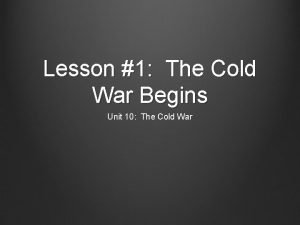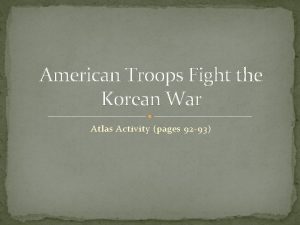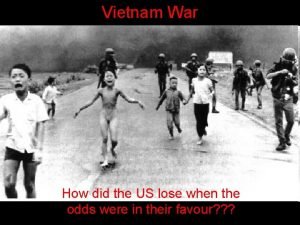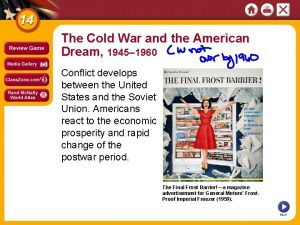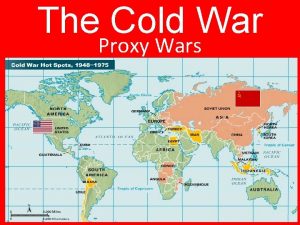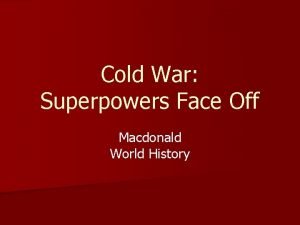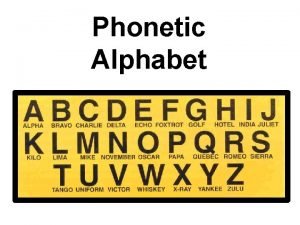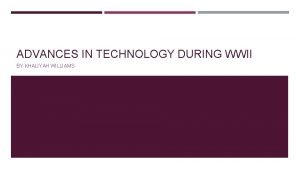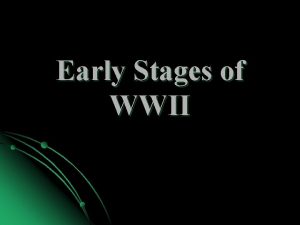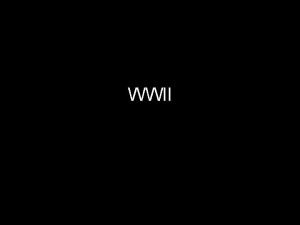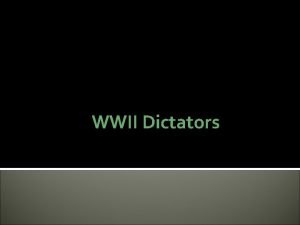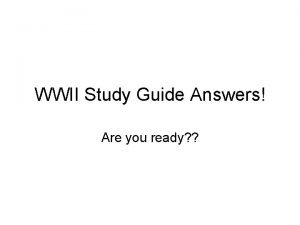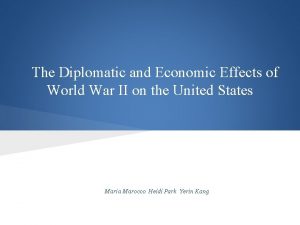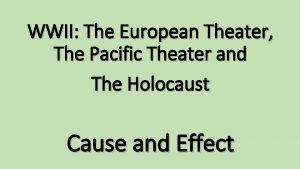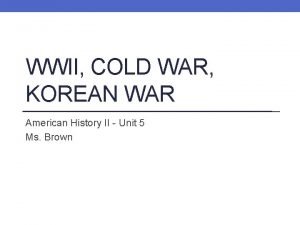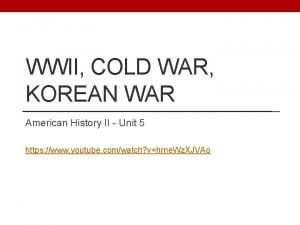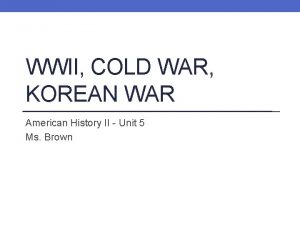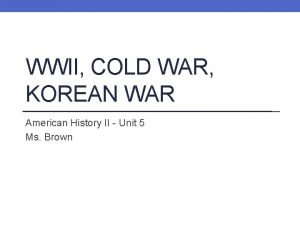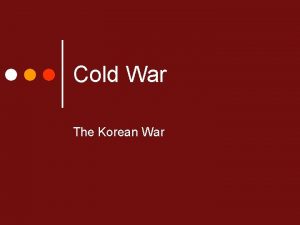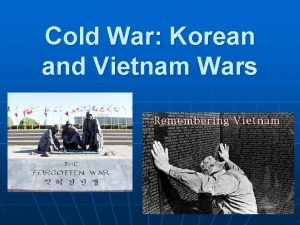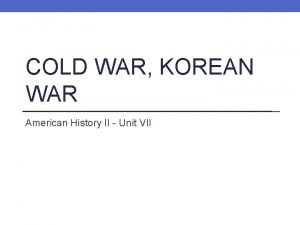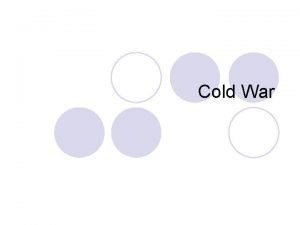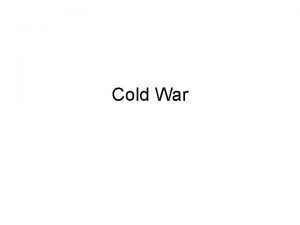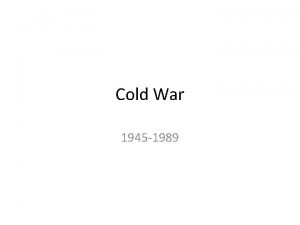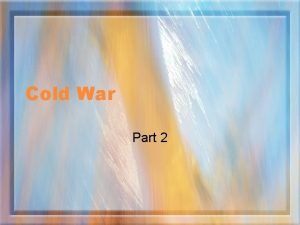WWII COLD WAR KOREAN WAR American History II















- Slides: 15

WWII, COLD WAR, KOREAN WAR American History II - Unit 5 Ms. Brown

Review • How was life for farmers different in WWII than in the 1930 s? • Very prosperous – good weather, improvements in technology and agriculture science, and the payment of debts • What was the GI Bill’s purpose? • To help returning GIs readjust at home – education, technical training, loans to buy farms or homes • What was Executive Order 9066? • FDR’s declaration to intern Japanese Americans on the west coast • What was the ruling in Korematsu v. US? • The federal gov’t and the POTUS have the right to make any discriminatory law or order if it serves an extremely compelling national interest • Internment of Japanese Americans was constitutional in order to protect national security.

5. 7 – ORIGINS OF THE COLD WAR

Former Allies Clash • US • Capitalism – private citizens controlled almost all economic activity • POTUS and Congress elected by the people from opposing parties • Furious Stalin supported Hitler for a period of time • USSR • Communist dictatorship – state controlled all property and economic activity • Stalin established a totalitarian government with no opposing parties • Stalin resented the western Allies for waiting so long to attack Germany directly • Frustrated that the US kept the atomic bomb development secret

The United Nations • April 25, 1945 – 50 nations met in San Francisco, CA to establish new peace keeping body June 26, 1945 – United Nations charter signed • Intended to keep peace, but US and USSR used it as a forum to spread influence over others • UN has four goals: • To keep peace throughout the world; • To develop friendly relations among nations; • To help nations work together to improve the lives of poor people, to conquer hunger, disease and illiteracy, and to encourage respect for each other’s rights and freedoms; • To be a center for harmonizing the actions of nations to achieve these goals.

The Potsdam Conference • July 1945 – Big Three (US, USSR, Britain) met at final wartime conference in Potsdam, Germany • 4 things had changed since Yalta Conference in Feb 1945 • • USSR occupied eastern Europe New British Prime Minister - Attlee New POTUS – Truman US tested atomic bomb • USSR prevented free elections in Poland (violation of Yalta Conference compromises) Truman angered • Spread of democracy/self- determination in eastern Europe halted • Hard to sell US goods to eastern European countries

Stalin and Eastern Europe • USSR felt justified in dominating eastern Europe • Huge war deaths (20 M), many civilians • Physical destruction caused by warfare • Wanted to stop future invasions • Stalin set up communist gov’ts in Albania, Bulgaria, Czechoslovakia, Hungary, Romania, Yugoslavia, and Poland satellite nations (countries dominated by USSR) • 1946 – Stalin gives speech • Communism and capitalism incompatible • Another war inevitable

Goals: US vs. USSR • US • Self-determination for all nations • Gain access to raw materials and markets for industries (unrestricted trade) • Rebuild European countries and economies stability and new markets • Reunite Germany and ensure productivity • USSR • Encourage communism • Rebuild economy using satellite nations’ raw materials • Control eastern Europe to balance US influence in western Europe • Keep Germany divided to prevent future threats

Containment and the Iron Curtain • Time to stop “babying the Soviets” – Truman • Feb 1946 – policy of containment – taking measures to prevent any extension of communist rule to other countries • West Europe vs. East Europe = “iron curtain”

Cold War • Cold War – conflict between the US and USSR between 1945 -1991 in which neither nation directly confronted the other on a battlefield

Truman Doctrine • US and Britain need to prevent communism in Greece and Turkey, but Britain broke US takes charge • March 1947, Truman and Congress allocated $400 M in economic and military aid to Turkey and Greece • “It must be the policy of the US to support free peoples who are resisting attempted subjugation by armed minorities or by outside aggressors. ” Truman Doctrine – policy of providing aid to free nations threatened by internal/external opponents


Marshall Plan • European countries in postwar devastation and may look to Stalin for help… • 1947, Sec. of State George Marshall Plan • US provides aid to all European countries that need it • “not against any country or doctrine, but against hunger, poverty, desperation, and chaos. ” – Marshall • Revived Europe, by 1952… • 16 countries received $13 B in aid • Western Europe flourishing, preventing spread of Communism

Conflict Over Germany • 1948 – 4 sections combined into 2 • West Germany (and West Berlin) – US, Britain, France • East Germany (and East Berlin) – USSR • Stalin closed rail access to West Berlin no food or fuel, enough to last 5 weeks • Berlin Airlift – 327 day operation in which US and British planes flew food and supplies to West Berlin after the Soviet blockade in 194849 • 277, 000 flights • 2. 3 million tons of supplies

NATO Alliance vs. Warsaw Pact • 1949 • West Germany Federal Republic of Germany (included West Berlin) • East Germany German Democratic Republic, USSR controlled (included East Berlin) • April 4, 1949 – North Atlantic Treaty Organization (NATO) formed • Belgium, Denmark, France, Britain, Iceland, Italy, Luxembourg, the Netherlands, Norway, Portugal, US, and Canada (later Greece, Turkey, and West Germany) • Pledged military support to each other in the event of an attack • First time in history the US entered a military alliance during peacetime No more US isolationism! • 1955 – Warsaw Pact – military alliance between USSR and 7 eastern European nations
 The cold war begins lesson 1
The cold war begins lesson 1 American troops fight the korean war 48a answer key
American troops fight the korean war 48a answer key Description
Description Truman vs eisenhower venn diagram
Truman vs eisenhower venn diagram American dream cold war
American dream cold war Sides in cold war
Sides in cold war History of cold war
History of cold war Ww2 military alphabet
Ww2 military alphabet Advances in technology during wwii
Advances in technology during wwii Nye committee
Nye committee Wwii picture
Wwii picture Wwii picture
Wwii picture Ww2 study guide answer key
Ww2 study guide answer key Wwii effects
Wwii effects Wwii show
Wwii show Wwii
Wwii
